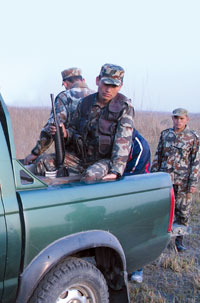|
|
| GUARDING GRASS: An army patrol stops at Sukla Phanta's unique grassland habitat to look for signs of poacher activity. |
The military base is at the edge of the jungle, overlooking a vast grassland that stretches as far as the eye can see. There is a watch-tower with a sentry manning a machine gun. Sandbagged pill boxes and concertina wire surround the base.
The Nepal Army at this forward post is not fighting Maoist guerrillas anymore, neither is it deployed to guard Nepal's border with India which is only two kilometers away.
It is here to protect the Sukla Phanta Nature Reserve in the southwestern tip of Nepal from armed poachers. This 305 sq km sanctuary has Tarai's original hardwood jungles and a unique grassland habitat with swamp deer, wild boar, tiger, wild elephant and other species.
Indeed, if it hadn't been for the military, Sukla Phanta, Bardiya, Chitwan and Kosi Tappu would have by now been decimated by poachers and squatters as have some national parks across the border in India.
"There is just too much pressure on land, and cross-border criminal gangs hunting tigers and rhinos are so active that you need a physical military for deterrence," says a Nepal Army officer who mans a base in Bardiya.
After 2001, many of the bases in the tarai parks were pulled back and the army's total troop strength at nature reserves was reduced by 70 percent. The conflict also affected the intelligence network of villagers that had been established on the park perimeter to counter wildlife traffickers.
The result was a dramatic surge in poaching. Chitwan lost 165 rhinos in the past five years, and 72 rhinos have been killed in Bardiya, many of them translocated at great expense from Chitwan.
While the count for dead rhinos is fairly accurate because poachers hack off the horn and leave the carcass behind, every part of a tiger can be sold, so there is no trace. In Chitwan, an estimated 30 tigers have been killed in the past five years. Here at Sukla Phanta, a tiger census is in progress but so far only seven tigers have been counted from an original population of about 25.
Chitwan is high-profile and has more resources from tourism, so it has re-established many of the jungle bases that were abandoned during the war. As a result, rhino poaching has all but stopped.
But in Bardiya and Sukla Phanta, there is no budgetary or other support from Kathmandu. Even the army can't do much. Ironically, things have got more difficult since the end of the conflict because the National Parks Directorate at the royal palace that used to command the army in parks has been handed over to the ministries.
"We need at least three more outposts to check cross-border poachers, we need more vehicles for patrolling," says an exasperated army officer here, "what is the point keeping the army in the barracks, let them guard the national parks."
The only hope conservationists here have is that after the polls, there will be enough political stability to bring back the tourism entrepreneurs who abandoned their hotels during the conflict. With tourists will come revenue to fund anti-poaching units.
It is evening when a herd of swamp deer, with wild boars in attendance, come grazing to the base perimeter. They scatter when visitors in civilian clothes appear, but aren't afraid of an approaching soldier.
"They recognise our camouflage fatigues," says the soldier.
Kunda Dixit in Sukla Phanta, Kanchanpur



